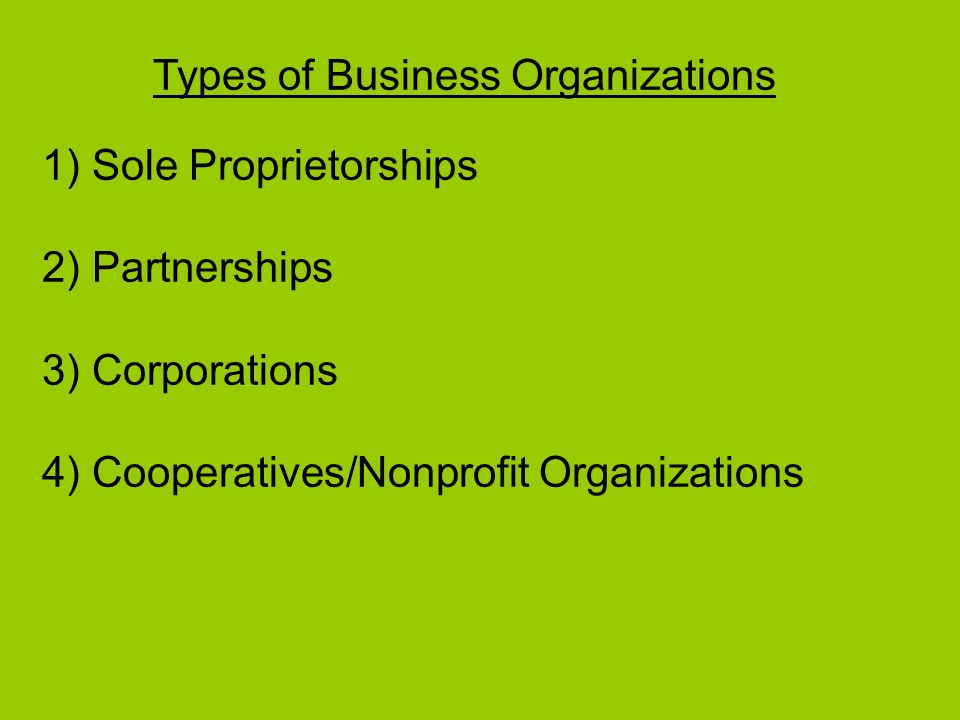Types of Business Organizations in Nigeria, USA and UK.
If you’re an entrepreneur or a founder looking for the best business ownership to startup, here is 6 Types of business organizations in Nigeria, USA and UK that you may consider. The failure to understand the different types of business organizations out there might make starting and growing a business seems a daunting task.
Of course, choosing the best business structure will greatly affect the way you run your business and will ultimately affects your business success and growth in the future. Knowing the legal requirements for starting a business in Nigeria is also important.
You will also need responsive website designs, corporate branding, social media marketing and search engine optimization strategies that would set your business apart from other competitors; increase your online visibility and sales in today’s business environment that is now an online marketplace.
This is because; some business structures work best for specific types businesses and this is also dependent on different locations or jurisdictions such as Nigeria, United State of America (USA) and in the United Kingdom (UK).
You Need to Consider Everything From:
- business model (online/offline)
- capital investment,
- administrative control,
- risk of liability,
- taxation, and
- the ability to grow in the business.
The key here is to figure out which type of entity gives your business the most advantages when it comes to helping you to achieve your organizational, personal and financial goals.
There are six basic types of business organizations in Nigeria, USA and UK that we are going to discuss in this artice; each of which has its own advantages and disadvantages – so get ready to read more for detailed information.
These Types of Business Organizational Structures are Classified as Follows:
- The Sole Proprietorship,
- Partnerships Business,
- Nonprofit Organization,
- Limited Liability Company (LLC);
- Cooperatives Businesses and
- The Corporation
6 Types of Business Organizations in Nigeria, USA and UK.
#1. Sole Proprietorship Business
This is the simplest, cheapest and mostly frequently used form of business organizations. The sole proprietorships are the mum and dad businesses which are so easy to start-up that you could be in one and not even know it.
For examples:
- If you ever do contract works for a company and you are not on their payroll, then you are a sole-proprietor.
- Your kids selling watermelon down the street is a sole-proprietorship.
Sole proprietorship usually involves just one individual who owns and operates the business enterprise.
Considerations in Proprietorship Business
If you intend to work alone, especially when you have learned the skill for the job and/or unfamiliar with the other forms of business organizations; then this is the best way to start many businesses.
The sole proprietorship business is an example of unlimited liability company. With sole proprietorship, one person is responsible for all the business profits or losses.
Yes! You will make all decisions; have complete control and freedom to enjoy the profits of the business. However, selecting the sole proprietorship business structure means you’re personally liable for your company’s debts, damages or legal claims.
Thus, most individuals thinking about growth will want to consider a more formal business entity. This is because with sole proprietorship, problems or lawsuits with creditors, employees and customers can put your personal assets including your home, car and bank credits at risk.
Again, raising money for a sole proprietorship can also be difficult. Banks and other financing sources are often reluctant to grant business loans to sole proprietorship businesses.
In most cases, you’ll have to depend on your personal credit or savings, family loans or by taking on business partners.
#2. Partnerships Business
A partnership business involves two or more individuals who agreed to share the responsibilities of a business enterprise.
There are two types of partnership businesses:
- General Partnership, and
- Limited Liability Partnership (LLP).
General Partnerships
This is where all the profits and losses are shared equally among partners. That is, partners will have equal unlimited liability for the debts of the business.
Limited Partnerships
A Limited Partnership business is where only one partner has control of the business operations (the general partner). While the other person or persons simply contribute money to and receive only part or percentage of the profits.
In this case, the limited partner receives profit sharing, but do not take an active role in the day-to-day operations of the business.
Considerations in Partnerships Business
Depending on the funding and liability structure, partnerships carry a dual status:
- as a sole proprietorship (general partnerships) and/or
- as a limited liability partnership (LLP).
But whichever one you choose to be, it is good to know that personal liability is a major concern if you decide to use a general partnership to structure your business.
In the case of liquidation, all that the limited partners have to lose is the total amount invested in the business (share capital).
#3. Nonprofit Business Organizations (NGOs)
A nonprofit organization is pretty self-explanatory. It is a form of firm organizations that’s intended to promote educational, religious, sports or charitable purposes.
As businesses limited by guarantee: the objects of this type of company is not profit motivated.
The “non-profit” or not-for-profit aspect comes into play in that any money earned by such a company must be kept by the organization to pay for its expense, programs, etc. And such money earned however, cannot be distributed to its members, or trustees.
Considerations in Nonprofit Organizations
Keep in mind that there are several types of non-profit organizations available; many of which may receive “tax exempt” status.
So, depending on the parameters of your new business venture, and your locations, such a company must not have a share capital.
#4. Limited Liability Company (LLC)
A Limited Liability Company is a hybrid form of the partnership business organizations and structuring. It allows owners, partners or shareholders to limit their personal assets while enjoying flexible tax benefits.
Though states laws may differ as to whether it is treated as a partnership or a corporation for states income tax purposes.
Considerations in Limited Liability Companies
Under Limited Liability Company (LLC), members are protected from personal liability for the debts of the business; as long as it cannot be established that they have acted in an illegal, unethical or irresponsible manner in carrying out the activities of the business.
If you need to explore other avenues for business funding — you may be better off establishing a limited liability company. However, there is some level of paperwork as well as costs associated with the incorporation of LLC.
For example, in the case of business failure or liquidation, members will only lose any unpaid Shares (i.e. assets contributed to the business as in the memorandum and article of association).
Caution: If you personally guarantee a debt in LLC, you’ve forfeited your “limited liability.”
Types of Business Organizations in Nigeria, USA and UK.
#5. The Corporations
The joint-stock company (or corporation in the US) is the most complex form of business ownership. According to the Nigerian company law, corporation is a form of Public Limited Liability Company (PLC).
A corporation has some huge benefits as an entity that is separated out from its owners. It provides limited liability for the investors, and owns its legal rights to engage in businesses — it can make contracts, sue, be sued, own and sell property, and pay taxes.
Howevre, because the life of the corporation is independent of its owners, the shareholders can sell their interests in the business without affecting its continuation. That is, investors can transfer their rights of ownership in the form of stocks, either common or preferred.
Considerations in Public Corporations
With Public Company, it’s easier to attract investment capital, increase insurance premium, hire key employees and raise huge money from the banks.
Although, the public organizational structure also, comes with a number of downsides. For example, using the structure follows more complex rules, regulations and more expensive than most other business organizations discussed above. The corporation files its own tax return and pays taxes on its income.
If the corporation distributes some of its earnings in the form of dividends to shareholders; and it does not deduct the dividend in computing its taxes, but the shareholder recipients must pay taxes on those dividends even though the corporation has paid taxes on its earnings.
We will discuss more on corporation letter on our business formation series. Nonetheless, you’ll probably need the assistance of an attorney to guide you through the public company incorporation processes.
#6. Cooperatives Business Organizations
Another interesting form of business structure that most people don’t often understand is the cooperative business.
This is a form of business organization that is fully owned and operated for the benefit of the members of the organization – that use its services.
In other words, whatever is earned by the cooperative is sheared out among the members themselves, and is not required to be paid out to any external stakeholders, etc.
Considerations in Cooperatives Associations
Unlike other types of business organizations which have shareholders, cooperatives sell shares to cooperative “members,” who then have a say in the operations and direction of the cooperative itself.
The main difference in the process of starting a cooperative, as opposed to the other types of businesses listed above, is that the organization must create bylaws, have a membership application and have a board of directors with a charter member meeting.
In today’s social-economic environment, cooperative business institutions are used by many as a means of helping members when in need of consumer loans or short-term borrowing to fund basic needs like health care, shelter, business, education, etc.
Wrapping up: 6 Types of Business Organizations in Nigeria, USA and UK
Whether you are doing a business alone or with another person, understanding the different types of business organizations available can make the process simpler for new entrepreneurs who are having hard times selecting from a range of businesses.
Although, the types of business structures discussed in this session may reflect beyond the well known legal business structure as available in your own jurisdictions.
If you need more information about which business structure is right for you, we advised you speaking with a specialist in business law or a knowledgeable accountant for help.
Abbakin is a media company and creative agency in Nigeria. We provide free business information for all readers. Our mission is to inspire, connect and empower our people to become world class leaders who effortlessly do business across time zones.
If you have any question concerning how we can work together, kindly get in touch with us here.













Comments (3)
I love this , thank you very much
You’re welcome Beauty! Happy read.
Very concise and helpful